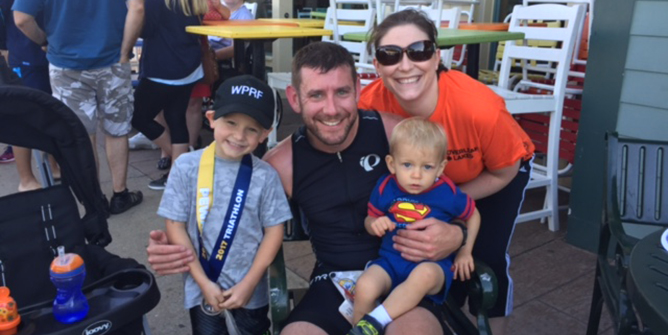
Active Dad Doesn’t Let Hemophilia Slow Him Down
He’s Completed Ten Triathlons Since 2015!
David Varney was diagnosed with Hemophilia B when he was 3 months old. He has never let his diagnosis slow him down, choosing to do the things he loves and wants to do, while remaining mindful of his hemophilia and taking care of himself. Today, David participates in triathlons on a regular basis – an amazing accomplishment.
David has the most incredible and positive support system. His family and friends encourage him to follow his passions and not let his condition stop him from doing the things he loves. He also credits Great Lakes Hemophilia Foundation (GLHF) for the support they have provided throughout his journey.
It is important to David to connect with other people living with a bleeding disorder and learn about his bleeding disorder. Many years ago he became involved with the Hemophilia Outreach Center in Green Bay, a treatment center that is partially funded through a federal grant managed by GLHF. There he learned about hemophilia and staying healthy.
David started participating in GLHF’s Hemophilia Walk in 2012. “The walk creates a great sense of community,” said David. “It’s a safe place to feel connected and supported by other people who are just like you. There is no judgment and you can be exactly who you are.”
David now participates in the walk every year with Team Varney. The team, led by David’s wife Leslie, raises funds for the bleeding disorders community. His two sons, Liam (1 year) and Jack (5 years), along with Leslie, are always by his side supporting him.
Follow Your Passion
As a young man, David always participated in sports including soccer, golf and basketball. So, when David saw his father complete a triathlon 11 years ago, he knew that it was something he wanted to do. Since 2015 David has completed ten triathlons. More recently, he participated in an Ironman 70.3 mile race in Madison. He continues to show that living with a bleeding disorder does not mean you have to live a sedentary life.
David’s only fear has been his ankles. He has had ankle problems his entire life —a complication from hemophilia. “That’s why running has always been one of my biggest accomplishments,” said David. “There was a time when I thought I may never be able to run with my kids or help them learn how to ride a bike,” said David. Today David is confident he will not miss these important moments.
David wants people to know that family and friends of people with a bleeding disorder do not need to be afraid. When he was young, his mother knew that he was going to have bleeds and she accepted that. “She never wanted me to be ‘My son David who has hemophilia,’” said David. “She just wanted me to be, ‘My son David.’ She never wanted it to limit me. She never wanted it to define me.”
Take Care of Yourself
When asked how training for a triathlon was different for him as opposed to a person without hemophilia David’s answer was both honest and introspective. “Everyone has their weakness. My challenge is hemophilia. Someone else may have a bad knee, or a bad back. I believe I’m no different than any other competitor in these races. I just need to make sure I prepare by training and taking my medicine.”
David stressed that exercise and nutrition are an incredibly important part of successfully managing his bleeding disorder. “I have learned that when I’m in pain, it impacts everyone around me. I have a chronic illness, but it doesn’t define me,” said David. “I can accomplish anything as long as I take good care of myself.”
Finding Support
“The Hemophilia Walk gives us a voice and promotes a healthy lifestyle. It affords us the opportunity to get up, walk around and be active,” said David. “I bleed less the more active and healthy I become.” David said that from the moment he walks into the Milwaukee County Zoo on walk day, he feels a sense of community.
“We get to meet other families that have the same struggles that we have. There is a special bond like no other that is created through events like this. I understand their struggles and I can relate. When other people with bleeding disorders hurt, I hurt. We are one, we are a community that is stronger together than separate.”